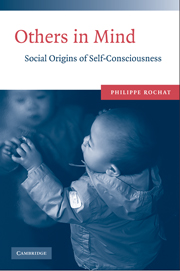Book contents
- Frontmatter
- Contents
- Foreword by Jerôme Bruner
- Preface
- Introduction: Main Ideas
- 1 Self-Conscious Species
- 2 Six Propositions
- 3 Varieties of Self-Reflective Mind State
- 4 Mind States in Development
- 5 Birth of Self-Consciousness
- 6 Shame and Self-Knowledge
- 7 The Roots of Guilt
- 8 Giving and Sharing
- 9 Origins of Owning and Sharing
- 10 Social Construction of Identity
- Conclusion: Moral Space and the Self
- Postscript Note
- References
- Index
Conclusion: Moral Space and the Self
Published online by Cambridge University Press: 05 August 2012
- Frontmatter
- Contents
- Foreword by Jerôme Bruner
- Preface
- Introduction: Main Ideas
- 1 Self-Conscious Species
- 2 Six Propositions
- 3 Varieties of Self-Reflective Mind State
- 4 Mind States in Development
- 5 Birth of Self-Consciousness
- 6 Shame and Self-Knowledge
- 7 The Roots of Guilt
- 8 Giving and Sharing
- 9 Origins of Owning and Sharing
- 10 Social Construction of Identity
- Conclusion: Moral Space and the Self
- Postscript Note
- References
- Index
Summary
To know who I am is a species of knowing where I stand.
Charles Taylor, Sources of the SelfI have organized this book along two axes – a blunt, commonsense evolutionary statement and a simple emotional matrix. The blunt statement is that without others, we are nothing. The simple matrix is that the bottom line of what we feel, we do, and we think is driven by the fear of rejection. Coping with the basic need to be with others and fearing rejection by them are constitutive of the context in which we, as a species, evolved self-consciousness. All we do, as a result, is with others in mind.
This schema is admittedly simple and leaves many questions unanswered. In particular, two questions are left out that I would like to address in this conclusion. These questions are, respectively, Why do we have this basic affiliation need? Why do we have this basic fear of being rejected?
My goal here is to address these questions beyond the utilitarian interpretation that we need to affiliate and fear being rejected because we are biologically designed to maximize our resources and our chances to survive as members of our species. We need to go beyond the idea that the constitutive needs to affiliate and fear of being rejected are the expression of evolutionary adaptations of our species, beyond the truism that they are just consequences of phylogeny. This kind of sociobiological account, even if illuminating on the scale of evolution, is profoundly unsatisfactory at a psychological level.
- Type
- Chapter
- Information
- Others in MindSocial Origins of Self-Consciousness, pp. 213 - 228Publisher: Cambridge University PressPrint publication year: 2009



